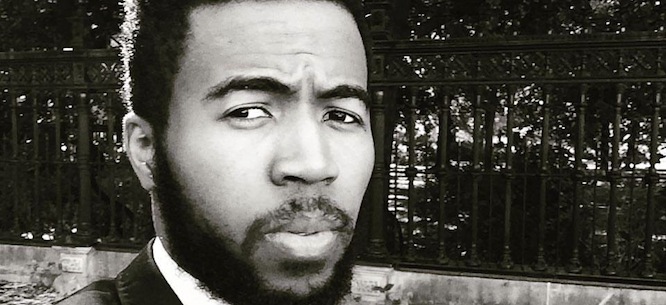The Sobbing School: Three Poems
The Sobbing School: Three Poems
Three poems from Joshua Bennett’s The Sobbing School.

Teacher’s Aide
My father showed up to school that day dressed up
as a man with a son with a rage problem; that is, a boy
whom violence—as if rumor, fresh from out of town
—followed everywhere. Ms. Hollinger never mentioned
the more practical elements of this ongoing conflict,
that I fought the other students because I liked my blood
very much & wanted to keep all of it inside of my body
once the playground went feral, as it was wont to do.
From his first day on the new job, my father
would bribe the bullies as only a Casanova of his stature
could, butterscotches & dirty jokes quelling all prior conflict.
The shift was immediate. Now baptized in the flame
of an older man’s beauty, the war on the wise guy
was no more: a cease-fire forged by sheer esteem,
the stuff of corner-store science fiction it was,
this lovely Marine standing watch, half smile
drawing both teachers & seventh-grade girls
to him like lightning to a god of gold.
Still Life with Little Brother
Every time I attempt what I’m attempting
right now, it ends up as some sad lyric
about diagnosis & that sounds like
the one kind of violence I don’t have
a pretty name for. In advance, I don’t know
if this poem will bring the problem onstage
& then pretend it went away to college. I don’t know
if there is any way around the problem itself,
which is that I can only call something love
if it comes packaged in language I can feel
the weight of & my brother doesn’t always
look at me when I visit the house. Sometimes
he walks in & sits on the couch & watches
TV while I’m watching TV & our shared
thereness is a prize. Sometimes he asks
about me when I’m gone
& no one else ever does that.
Levi is my brother’s name
& I wrote a poem
about him once
& it wasn’t about him
as much as how fear stalks me
like an inheritance, how I fear
for him with all of my love,
how I know the world
like I know the names
of famous poets & the world
has claws, Levi. When you were born,
I ran back & forth across Auntie’s
apartment until the floorboards complained
& I am still like that. I am still more proud
than I am brave & you are still the great joy of
our rugged hometown, an outlaw all the same.
Please, excuse my shadow. I can’t
stop leaving. I don’t know how
to name what I don’t know
well enough to render
in a single sitting. Every poem
about us seems an impossible labor,
like forgetting the face
of the sea, or trying to find
a more perfect name for water.
On Blueness
which is neither misery
nor melancholy per se,
but the way anything buried
aspires. How blackness becomes
a bladed pendulum swaying between
am I not a man & a brother
& meat. How it dips
into the position
of the unthought,
then out. Trust me.
Foucault isn’t
helpful here. I am after
what comes when the law leaves
a dream gutted. The space
between a plea & please.
A mother marching in the name
of another woman’s dead children.
Not the anguish she carries alongside
her as if it were a whole, separate person,
but the very fact of her feet
addressing the pavement,
the oatmeal she warmed in the microwave
that morning, sugar & milk
& blueberries blending in a white bowl
as she reads the paper, taken aback
only by the number of bullets
they poured like a sermon into him.
How despair kills: too slow to cut
the music from a horn, or set
my nephew’s laughter to dim.
I am dying, yes, but I am not the marrow
in a beloved’s memory just yet.
Who can be alive today
& not study grief?
There are bodies everywhere,
but also that flock of cardinals
making the sky look patriotic.
The above poems are from The Sobbing School by Joshua Bennett and selected by Eugene Gloria, published as part of The National Poetry Series by Penguin Books, an imprint of Penguin Publishing Group, a division of Penguin Random House LLC. Copyright © 2016 by Joshua Bennett.
Read Dissent’s interview with Joshua Bennett about writing poetry after Ferguson.





